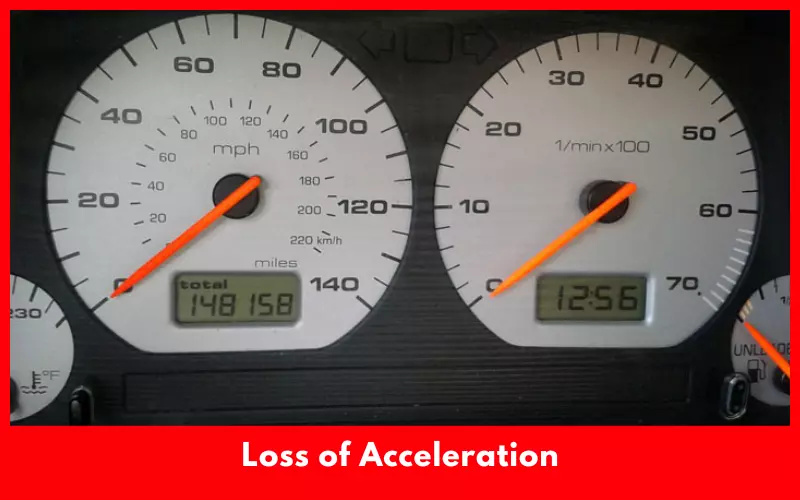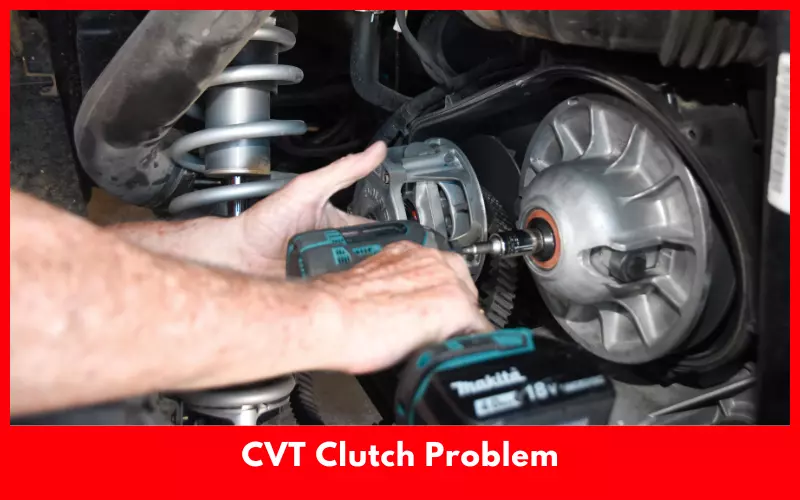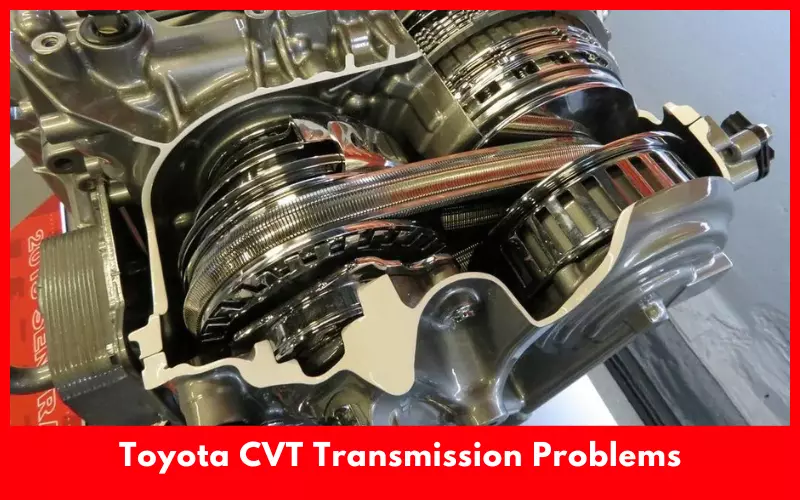Toyota has the most reliable Continuously Variable Transmission (CVT) which makes the brand the best choice for smooth acceleration and improved fuel economy. Still, many Toyota owner experiences some issue with their CVT gearbox that needs attention.
Common Toyota CVT transmission problems are overheating, delayed motion, making whining and rattling noise, and loss of acceleration. The gearbox can also start jerking or slipping and the car can activate the check engine light due to the faulty CVT transmission. It’s expensive and almost impossible to repair CVT transmission.
So, ensuring sufficient fluid in the engine, avoiding towing, and taking proper care of the transmission can help prevent causing any issues with the Toyota CVT transmission. Let’s discuss this briefly.
Article Summary
Common Toyota CVT Transmission Problems with Solutions
CVT gearbox comes with a simpler design and fewer components than the other type of transmission. Whether you have a Toyota with CVT gearbox or planning to own one, you should be aware of these CVT transmission problems:
1. Overheating
Your Toyota’s CVT transmission may become overheat due to changing the gear ratio continuously. Improper use like towing heavy items, particularly with insufficient or worn-out fluid can also make the CVT transmission overheat. A faulty cooling system or oil pump can impair the transmission fluid and overheat the transmission.
The symptoms of overheated CVT transmission include smelling burning odor and noticing a warning light on the dashboard.

If the transmission overheats due to driving continuously for a long time, cool off the CVT transmission, and then drive the car. But if it happens due to a complex issue, bring the car to a service center for repairing or replacing the transmission.
2. Delayed Motion
A healthy and good amount of transmission fluid keeps the transmission cool and prevents causing mechanical damage. But if you use the wrong or old transmission fluid, the transmission’s components can get damaged and causes delayed motion. The transmission fluid can also wear out and your Toyota car can leak fluid which can result in a CVT transmission problem.
If you notice red fluid leaking out of your Toyota car and smell the sweet odor, there might be a problem with the transmission fluid. Contaminated transmission fluid can also causes CVT transmission problem and other issues like car shaking, jumping, lurching, and surging.
To avoid this problem, check the transmission fluid regularly and replace it at the right time following the manufacturer’s recommendation. Even many Toyota owners replace transmission fluid within short intervals that require as it makes the CVT transmission healthier.
3. Hearing Whining and Rattling Noise
A faulty CVT transmission fluid makes a strange sound like clunking, whining, and rattling during driving the car or even in neutral mode. This symptom indicates that the transmission components are worn out or there is insufficient fluid in the transmission.
In this case, you should call an expert mechanic as it requires a deep diagnosis. The wired sound of car may come from bad suspension, faulty wheel bearings, or a damaged braking system. So you may either need to top up the transmission fluid or replace the worn or damaged components.
4. Loss of Acceleration
CVT transmission is reliable for providing smooth acceleration during pressing down the paddle. It can fail or take a longer time to accelerate if the system is damaged.

4. Gear Slipping or Jerking
Your CVT transmission can slip or jerk excessively due to the weak structure of the transmission. Lack of transmission fluid can also disturb the steady adjustment of the transmission’s belt, pullet, or pulleys and causes the transmission’s jerk or jump. The sign includes rise and fall in the RPMs while the speed remains stable. If you don’t solve this problem, it can break the chain or rope.
So, if you experience the transmission’s jerking or jumping, stop the car and diagnose the car to resolve the problem. However, a degree of jerking is allowed during shifting the CVT gearbox between low and high. A little bit of car jerking is also normal at low speed.
6. Check Engine Light
Vehicles like Nissan, Ford, and Honda activate the “check CVT transmission” light if there is any problem with their CVT gearbox. Since Toyota doesn’t have this certain light, it turns on the check engine light due to the same problem. The other symptoms include variation in engine revs and shifting lag. You must diagnose the transmission properly to determine and fix this issue.

7. Control Module Problems
The CVT has a transmission control module (TCM) that collects signals from various sensors and decides the reaction way of transmission. A damaged TCM can cause unusual behavior of CVT transmissions like gearbox’s excessive slipping, and delayed engagement. While a faulty control module can cause instant electronic problems, it takes time to damage the structure.
7. CVT Clutch Problem
The CVT’s clutch stands between the transmission and the engine. After pressing the gas pedal, the clutch slowly engages the transmission and engine to ensure smooth take-off. But a faulty CVT clutch can cause a jumpy start, rolling forward, and delayed engagement. You can solve this problem by reprogramming the CVT clutch after changing the transmission fluid.

How to Diagnose Toyota CVT Transmission Problems
You can diagnose your Toyota’s CVT transmission problem simply by hearing strange sounds or noticing any signs that we’ve already discussed. Toyota CVT also has an onboard computer that makes the car more efficient.
This computer can make the diagnosing and repairing process more complex. In this case, you won’t be able to make proper troubleshooting of Toyota CVT transmission problem at your home garage. So, bring your Toyota vehicle to the nearest service center that has diagnostic technology to interface with the onboard computer of your car.
To determine the CVT’s transmission problem, they’ll connect your car’s computer to a diagnostic device and generate a code. Using the code, they’ll easily determine the underlying sources and fix them quickly and easily. They may also decide if the car requires lift inspection or pan examination to solve the transmission problem.
But if your Toyota CVT transmission is built within a few years and it still covers the warranty, take your car to the Toyota Customer Experience Center. They’ll check every possibility and solve the problem without any charge.
How much does it Cost to Replace the Toyota CVT Transmission?
The Toyota CVT transmission is quite expensive compared to a conventional automatic transmission. So you may have to spend around $6500 including labor costs to replace your faulty CVT transmission with a new one.

However, the actual cost of CVT transmission depends on the model. If you are planning to repair your CVT transmission, it mightn’t be possible. Even after spending around $1800 on repairing your Toyota CVT transmission, it mightn’t last more than 10,000 miles.
But if you need to replace damaged TCM, it’ll cost around $750 to $808. Replacing a faulty CVT clutch can cost between $800 and $1,500.
How Long Does A Toyota CVT Transmission Last?
On average, the Toyota CVT transmission lasts around 120,000 miles. After that, you can either replace the transmission and use it for another 40,000 miles with various problems or replace it with a new one.

In rare cases, some Toyota CVT transmissions last up to 160,000 miles without showing any problems. The longevity of a Toyota CVT transmission depends on lots of factors including your driving skill, maintenance, and the oil type.
So if you control the gear ratios, check and maintain the transmission regularly, and use the right fluid, your CVT transmission will last much more mileage.
One more thing, Toyota CVT is used in the most reliable car, the Corolla. Toyota and Honda are the two manufacturers who design and manufacture their own CVT transmissions.
Tips to Increase the Longevity of Toyota CVT Transmission
Many CVT transmissions are broken on the highway due to overheating or towing heavy trailers. When you are planning to prolong your CVT gearbox’s longevity and avoid expensive replacement, you should avoid those bad habits to reach the goal. The more careful you’ll be with the Toyota CVT transmission, the longer time it’ll take to replace the transmission.
You can avoid most Toyota CVT transmission problems simply by keeping the transmission fluid level up, particularly during long driving. Below are some tips to prolong the longevity of Toyota CVT transmission:
- Though Toyota permits you to tow some weight, doing so can reduce the longevity of your CVT transmission.
- Don’t overload your Toyota vehicle as it damages the CVT transmission faster.
- Instead of driving at one speed, change the speed to 5 mph every 15 to 20 mph. Don’t drive conservatively on rough terrain or uphill and avoid applying the acceleration abruptly.
- Don’t use the wrong brand’s oil or filter beyond the manufacturer’s recommendation. Change the transmission fluid every 100,000 miles.
- Inspect the engine’s cooling system regularly to keep its functionality in optimal condition to prevent the transmission from being overheated.
- Warm up your vehicle before start driving.
FAQs
Which Toyota models have CVT transmission problems?
Toyota upgraded the CVT transmission in Corolla, Avalon, highlander, Camry, RAV4, and Matrix. Since these models use the same CVT gearbox, each model may experience the same transmission problem.
Are Toyota CVT gearboxes reliable?
Toyota CVT transmissions are extremely dependable due to the smoother acceleration and improved fuel efficiency. Even Toyota manufactures their transmission maintaining the standard strictly for impressive fuel economy and long-lasting service.
Does Toyota CVT transmission have a warranty?
Of course. The Toyota CVT transmission comes with 60 months or 60,000 miles warranty. They also offer the same warranty on the engine, wheel drive system, and airbags.
Final Words
Toyota is still working to eliminate the problems with CVT transmission and improve its performance. However, you can avoid any difficulty with the existing one by maintaining the transmission properly, driving safely and avoiding towing heavy trailers. Before going out for long driving, make sure the engines has enough fluid, and if the engine becomes hot, cool it first.


Sounds like too much hassle. When i buy a vehicle i expect it to last 250,000 miles without major issues. With the price of vehicles today there is no excuse for CVT trannies going out at low mileage. Car warranty doesn’t guarantee you will have it replaced. If dealership does a repair it won’t last long. They rarely replace a CVT with a new one. So you’re stuck stranded and $6,500 poorer because of a crappy made CVT. Make them bullet proof then we’ll talk.